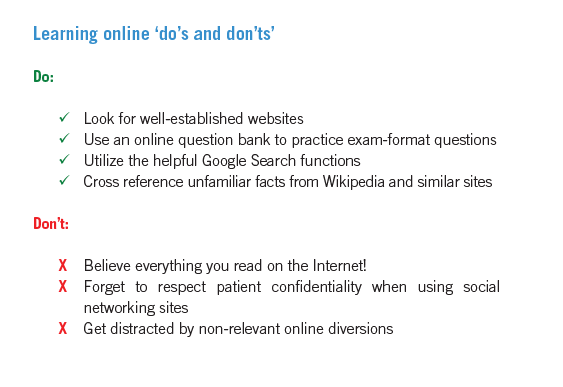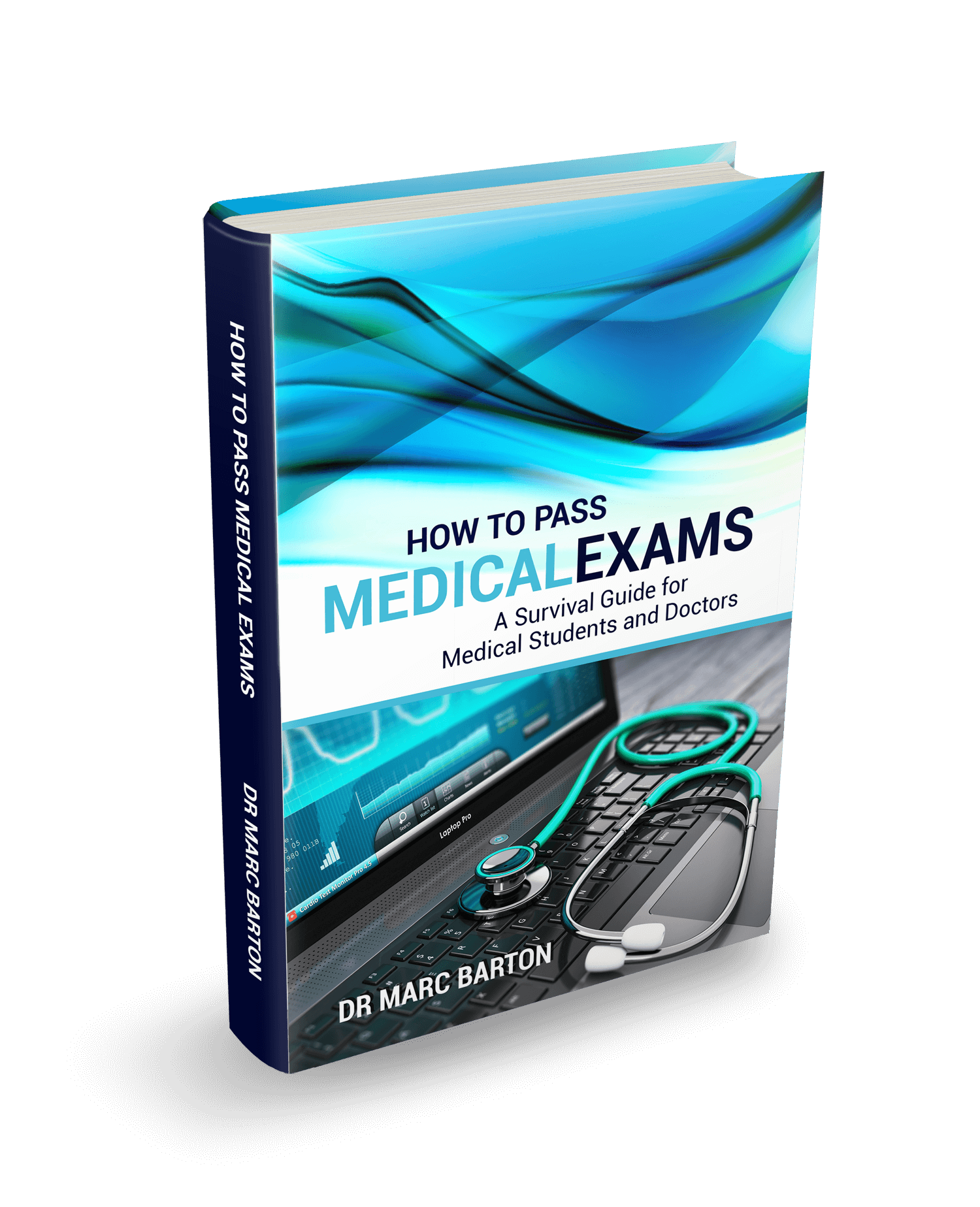“When I went to medical school, the term ‘digital’ applied only to rectal exams.” – Eric Topol
An embarrassment of riches
I can clearly remember a time when I had to catch a bus to go to the medical school library to find the resources that I needed to prepare successfully. Things have changed dramatically since then and there are so many different types of learning materials available online that it can be difficult to know what to use and when.
Welcome to the digital age
The advent of the Internet has undoubtedly made exam preparation easier. There are now numerous online sites available specifically designed to help people to prepare for medical exams. Medical schools and colleges often have online lecture material available and there are several good online sites that have practice questions available, an example being www.medicalexamprep.co.uk.
Unfortunately, not everything that you read on the Internet is true, and some information can be poorly presented and difficult to read. Try to look for well-established Internet resources that have input by qualified professionals with training and experience in the field you are studying. It is wise to check the sources of any information that you find and read any references that are listed.
Google Search
Google search is currently the most used web search engine on the World Wide Web and handles more than three billion searches every day. It is a great place to start when researching topics for your exam revision.
It also has numerous search functions that you might find useful during your exam preparation. Here are five that I have personally found particularly helpful:
- Searching content from a specific website
This can be done using the ‘site:’ command. For example if you wanted to search for the term ‘recent advances in endocrinology’ on the New England Journal of Medicine website you could do so by entering: recent advances in endocrinology site:www.nejm.org. Below you can see an example of the sort of results you might expect:

- Finding definitions
If you are unsure about a word’s meaning you can check the definition using the ‘define:’ command. For example if you wanted to check the meaning of the word ‘pneumoconiosis’ you could do so by entering define:pneumoconiosis. The definition will then be presented as shown below:

- Searching with a missing letter or word
If you are attempting to search for a particular word or phrase but cannot remember the exact spelling or wording, Google also has a search function to help with this. By placing an asterix (*) instead of the missing word or letter Google Search will come up with a list of potential alternatives. Here I have forgotten the exact name of an important study on sepsis:

- Searching for similar websites:
On occasion you may want to look for a website that is similar to another that you are currently using. This can be done using the ‘related:’ command. For example here I would like to find a website that is similar to the British National Formulary website:

- Google books:
If you go to http://books.google.com/ you can then search for a book you are looking for either by entering the author’s name or the title of the book. This function is particularly useful for checking references from other sources. Here I have searched for Instant Anatomy by Robert H. Whitaker:

Wikipedia
Wikipedia is a free-access, free content, Internet-based encyclopedia. It was launched in 2001 and has grown to become the world’s largest and most popular general reference work. Almost every medical topic that you can imagine is listed on Wikipedia and it is often the first port of call for students and doctors researching new topics.
Almost anyone can edit any of the articles on Wikipedia and there is no official editorial team. There are at present over 73,000 active editors and over 23,000,000 total accounts. It is a reference source like no other in existence and can be accessed almost anywhere in the world. This has both its merits and disadvantages. The information presented can sometimes be inaccurate and there is no way to check the credentials of the authors. On the other hand, the information is clearly presented and easy to read and incorrect information is generally corrected quickly on most topics.
If you choose to use Wikipedia as a reference tool during your exam revision I would highly recommend cross-referencing any facts that you are not familiar with and inspecting the corresponding reference that is listed at the bottom of the page.
Facebook groups and online forums
Another good place to look for advice and support in the run up to an exam are Facebook groups and other online forums and social networking sites. These groups and forums are filled with others such as yourself that are preparing for the same exams. Many people that contribute to the discussions in these groups have already sat the exam and there are sometimes hot topics discussed and questions from previous sittings discussed. They can be a good place to gain insights into the exam you are sitting, get vital tips for your preparation and also to gain support from others in the same situation as yourself.
It is worth remembering that medical students and doctors should be careful when posting on social media websites. You should treat colleagues with respect and consideration and protect patients’ confidentiality. The UK General Medical Council provides some sound advice on doctors’ use of social media, which can be read here: Doctors Use of Social Media.
YouTube videos
YouTube and online video sites can also be a useful source of information. There are numerous tutorials available as well as mock ‘Objective Structured Clinical Examinations’ (OSCEs) and videos that guide candidates through technical skills and procedures. These can be particularly useful when preparing for clinical examinations.
A final warning!
The Internet can be absorbing and, at times, extremely distracting. It is very easy to disappear and get lost ‘down the rabbit hole’ whilst attempting to study. Try not to get distracted by the myriad of diversions that the Internet holds, as before you know it hours will have slipped by with very little gained. I will talk more about how to combat these sorts of distractions in the next chapter.

Medical Exam Prep would like to thank Dr. Marc Barton for permission to reproduce this extract from his book ‘How to Pass Medical Exams: A Survival Guide for Medical Students and Doctors’
About Dr. Marc Barton
Dr. Marc Barton qualified from Imperial College School of Medicine in 2001. Since that time he has worked in a variety of different medical specialities. He worked as a GP partner from 2006 until 2008 and more recently as a higher specialist trainee in Emergency Medicine.
‘How to Pass Medical Exams’ is available for purchase here.






